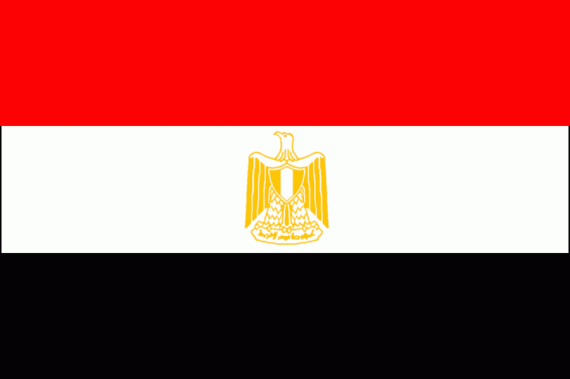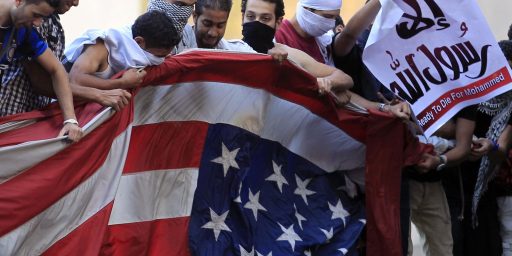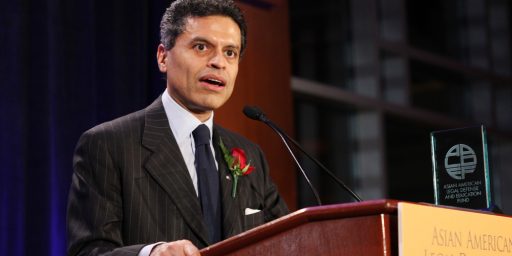The Military Still Runs Egypt
Remember Egypt?
 To return to a story from earlier in the year, Fareed Zakaria reminds:
To return to a story from earlier in the year, Fareed Zakaria reminds:
We think of Egypt as having gone through a regime change. But it really didn’t go through a regime change. Egypt has been run since 1952 by a military dictatorship. It is still run by a military dictatorship.
Mubarak resigned. A few people around him resigned. But at the end of the day the military still holds power. They have a huge vested interest in maintaining the current system politically, financially and socially. They aren’t going to go quietly into the night.
This is pretty much what I was trying to point out back at the time—that it was rather premature to talk of revolution (properly defined) in the Egyptian case. And, more importantly, that the military was not moving and acting as a tool of the people, but rather that they were moving to further their own interests. The fact that high level military actor decided that Mubarak had to go (and that they clearly removed him) was why I called it a coup at the time, and I stick by that assessment.
The interesting part will be to see how the elections later this year play out, and whether we see any institutional evolution after said election, and especially whether there is further movement towards deeper constitutional reform in post-election Egypt. There will also be the ongoing question of the military’s deep ties to the economy, as that is a key part of their power and influence (which, added to the guns and such, makes them pretty darn potent political actors).
Zakaria notes three possible models.
The first is Turkey, which is the idealistic, but likely unrealistic one:
I think the people who imagine a Turkish model where the Egyptian military steps back the way the Turkish military did are going to be disappointed. The Turkish military only relinquished power because the European Union absolutely insisted on it and made it a principle of Turkey’s path into the European Union.
The optimistic, but realistic, one is Indonesia:
The Indonesian military was very large, powerful and quite involved in business and the economy after Suharto’s fall. Over the following years, it has not been easy to get the military out and to erode its power. The process has been slow. But two democratic electoral transitions later you can see that there is some rebalancing. The democratic parts of the system – the national legislature and the elected president – have gained legitimacy, which gives them power.
The more pessimistic one is Pakistan: “where the military has allowed a lot of democratic processes that turn out to Kabuki Theater – behind the curtain the military actually runs everything.”
One can argue as to the degree to which these are perfect potential comparisons, but they do illustrate reasonable hypothetical pathways. And, certainly, these are not the only possibilities. Still, the most powerful institution in Egypt is the military, so the key question going forward is its evolution.






According to the CIA, Mohamed Hussein Tantawi is now running Egypt:
http://en.wikipedia.org/wiki/Mohamed_Hussein_Tantawi
You mean the commander of the Egyptian military?
Among other jobs.
I wonder how long it will be before people outside of Egypt and wonkville know his name?
The faceless juntas don’t seem to last.
Just curious, does the military run the secret police? It seemed to me from reading reports and watching broadcasts the people were more concerned with the police than the military. Is that correct or are they one and the same?
I am quite certain that when a future edition of the Polity dataset comes out, the current period will be marked as a “transition” between separate regimes, regardless of what the nature of the next regime is.
In other words, contra Zakaria, what happened in February was a regime change. We just do not know yet what the next regime will be.
In yet other words, it seems pretty clear (to me) that this was more than a simple substitution of the leader within the same regime.
@MSS:
I can live with the “transition” label.
I honestly think that the jury is still out, however, on exactly how much change has taken place, and this is why I am curious as to the way the elections will be conducted and what their outcome will be (and then how the institutions evolve after that moment).
Regardless of what model they use, two things are almost certain. There will be few if any women or Christians in the government.
And how is that Arab Spring working out in Egypt?
http://goo.gl/1dLVh
@Southern Hoosier
Could you maybe provide a link that has something to do with your actual claim?
if anything, the revolt in egypt showed that a massive nonviolent (very relatively speaking) uprising can force drastic change upon even the most entrenched dictatorships.
i guess the question is: does this current regime accept that change as legitimate, or does it devolve into even more brutal repression.
That was my opinion. All three models listed are Islamic. All Islamic government contains few if any women or other religions in there government.
Read more: http://www.foxnews.com/opinion/2011/05/20/coptic-christians-need-protection-help/#ixzz1O6ygcZPc
What change? The military is still in control and most of Mubarak people are still in place. They are just rearranging the deck chairs.
what change? i concede in my comment that the question is whether or not it will be lasting reform, but the ouster of mubarak and much of his cabinet is indeed quite drastic, no?
The military are the ones behind the curtain pulling the levers. They are the power brokers and they are still in charge.
This was the Cabinet that will work to reform the goverment and set the rules for the up coming election. The article also says:
So the military picked the cabinet and they will have a lot of say in what the reforms are and how the election is run. Hopwdully the military will talk a Western view of things.
http://goo.gl/S6EW9
An example of a drastic change was the Iranian Revolution. They went from a monarchy to a theocracy.